On this page
Introduction
Hertfordshire and West Essex Integrated Care Board (HWE ICB) is committed to learning from complaints and patient feedback and driving continuous improvement through the implementation of this learning. Patient feedback received by the ICB is managed in accordance with the HWE ICB Complaints, Concerns and Patient Feedback Policy and relevant legislation. The primary objective is to resolve each concern in a timely manner through clear explanation and constructive dialogue with the complainant.
This report provides a summary of complaints, concerns, and queries raised by patients, their families, and their representatives, which have been managed by the Hertfordshire and West Essex ICB Patient Experience team (PET) during the period from 1 April 2024 to 31 March 2025. The purpose is to provide assurance that the ICB has fulfilled its statutory responsibilities in relation to complaints management.
In line with the Local Authority Social Services and National Health Service Complaints (England) Regulations 2009, the ICB has a statutory duty to record and report the following:
- The number of complaints received.
- The number of complaints that were upheld (well-founded).
- The number of complaints referred to the Parliamentary and Health Service Ombudsman (PHSO).
- The subject matter of the complaints.
- Key issues arising from complaints or the handling thereof.
- Actions taken or planned to improve services as a result of complaints received.
Reflecting on 2024/2025
The PET has navigated a particularly challenging year, shaped by multiple interrelated pressures. These include:
- a sustained high volume of patient experience activity
- increasing complexity of cases
- workforce challenges, including vacancies
- the transition to a new Datix (local risk management) system
- the ongoing commitment to delivering high-quality, timely responses.
In September 2024, a new Assistant Director of Quality Improvement and Patient Safety was appointed, providing leadership and oversight of the patient experience portfolio. In partnership with the PET, a comprehensive review of the service was undertaken, culminating in the development of a structured Quality Improvement (QI) recovery plan. This plan benefits from executive oversight by the Director of Nursing and Quality and System Quality Director and is supported by regular progress reviews.
The recovery plan is multi-dimensional, with four core drivers:
- Improving processes to support those contacting us and our staff.
- Enhancing reporting and oversight.
- Supporting the team.
- Fostering wider learning and engagement.
Despite the pressures, there are clear indicators of improvement and innovation. One notable area involved the interface with the Continuing Healthcare (CHC) team. Persistent complaints and concerns prompted a review of open cases, leading to the establishment of a weekly joint review meeting between CHC and the PET. This initiative has yielded a significant reduction in open cases and generated actionable learning themes now being addressed by CHC (see Learning from formal complaints, PALS and MP PALS section).
The team also remains proud of its continued compliance with statutory requirements, specifically the three-day acknowledgement standard for complaints (see Acknowledgement of complaints). To increase efficiency and ownership, PET has also begun to broaden staff involvement in drafting complaint responses, a shift that aligns with the team’s ambition to streamline processes.
Looking ahead, the PET has undertaken a self-assessment against the NHS Complaint Standards, identifying key areas for further improvement. In addition, a thematic review of patient experience was presented to the HWE System Quality Group (SQG), and plans are being developed to launch a system-wide patient experience forum to further strengthen collaborative learning across the system.
While this year has tested resilience, it has also sparked positive transformation, and the foundations are now in place for sustained improvement.
Complaints
Overall activity
During 2024/25 there were 621 (n = 353 in 2023/24) formal complaints, received by the PET across the Integrated Care System (ICS). This is a 76% increase in formal complaints in one financial year, this does to some extent link to the delegation of primary care complaints, which was in July 2023.
Formal complaints by year comparison

Below is a Statistical Process Control (SPC) chart of complaints over the past two financial years. While the data generally reflects common cause variation, a special cause variation is evident from July 2024 onward, indicated by nine consecutive points above the mean. This suggests that patients in Hertfordshire and west Essex have growing concerns regarding the quality of care they receive or associated communication. These concerns are explored within the report.
Formal complaints 2023-2025
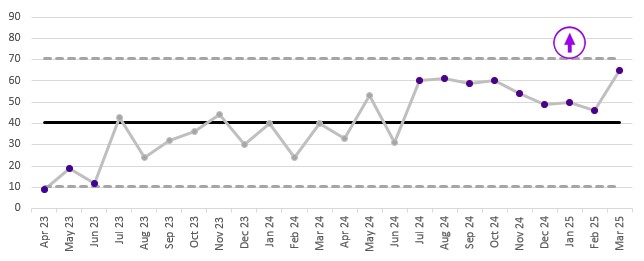
Increase in complaints
To understand the increase in formal complaints, a review and comparison has been undertaken, focusing on the providers involved and the outcomes of each complaint.
A total of 166 formal complaints have been carried over into 2025/26.
A year-on-year comparison of formal complaints logged in 2023/24 and 2024/25 shows notable increases in complaints related to providers and commissioner of healthcare:
- General Practice complaints rose by 67%.
- Complaints concerning the Hertfordshire and West Essex ICB increased by 118%.
- Dental service complaints rose sharply by 193%.
(See Learning from formal complaints, PALS and MP PALS).
Formal complaints received by the ICB by organisation by year
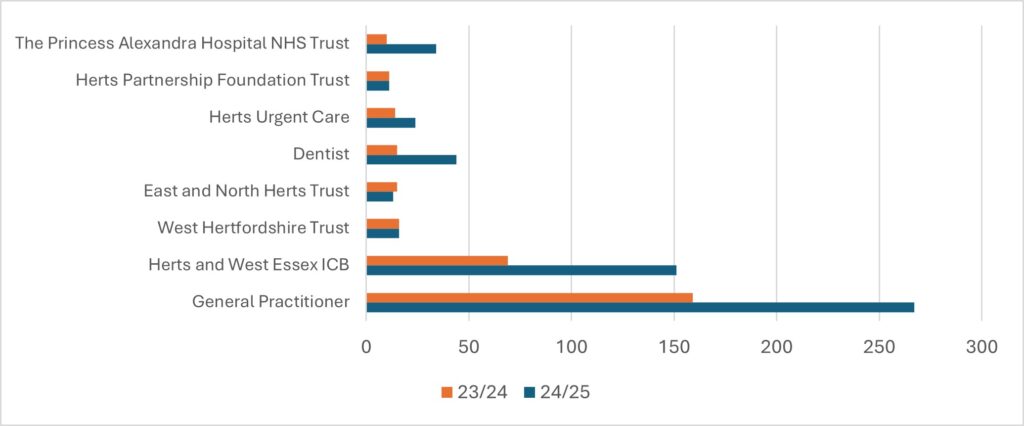
In terms of complaint outcomes, there has been a 134% increase in complaints sent to the ICB that did not progress due to the absence of consent from the complainant. The reason for this is unclear, as complainants did not respond to requests for consent – this may warrant a focussed review in future.
Additionally, there has been an 87% increase in complaints where it was established that the issue had already been, or is currently being, investigated by another provider.
In 2024/25, a total of 280 formal complaints were investigated, representing a slight increase of 4.8% compared to 267 in 2023/24. This figure excludes the 166 complaints that were carried over from the previous year.
Outcomes of formal investigations are discussed in the Closed complaints outcomes and Upheld/partially upheld complaints sections.
Acknowledgement of complaints
In accordance with the NHS (Complaints) Regulations 2009, all complaints must be formally acknowledged within three working days.
During the financial year 2024/25, 557 out of 621 complaints (89.6%) were acknowledged within the required timeframe. Notably, there was a significant improvement from October 2024 onwards, with 313 of 319 complaints (98.1%) being acknowledged within three working days. This demonstrates a marked enhancement in the timeliness of complaint handling, aligned with the quality improvement project.
Responding to complaints
The NHS (Complaints) Regulations 2009 recommend that complaints should be responded to within a relevant period. This is generally considered to be a period of six months commencing on the date the complaint was received or such longer period as may be agreed before the expiry of that period, in agreement with the complainant. However, HWE ICB aim to respond to complaints within the timeframes set out in the table below (as per the ICBs Complaints, Concerns and Patient Feedback Policy).
The PET aim to resolve complaints that relate to ICB functions only within 25 days.
Longer time frames such as 45 and 70 working days, relate to complaints that cover multiple organisations or considerable complexity, and consider of the standard response times of the provider organisations involved.
Compliance with timescales
| Complaint time frame | Completed in time? | % completed in time | Carried over |
|---|---|---|---|
| 25 working days | 19 of 93 | 20.4% | 33 |
| 45 working days | 27 of 38 | 71.0% | 19 |
| 70 working days | 235 of 324 | 72.5% | 113 |
| 120 working days | 0 | 1 | |
| Total | 281 of 455 | 61.7% | 166 |
Of the 455 complaints the ICB responded to in 2024/25, the average number of days to respond was 66 working days. This is an improvement on the 2023/24 average time frame, which was 88 working days.
In 2024/25, 411 out of 455 formal complaints (90.3%) were closed within six months (180 days). This is an improvement on 23/24 figures, were 297 out of 353 (84.1%) complaints were closed within six months (180 days).
Breakdown of complaint cases by investigation organisation
When a complaint is received regarding a service commissioned by the ICB, the complainant can choose whether the investigation is led by the ICB or by the provider organisation. The ICB generally recommends that the provider lead the investigation, as this tends to be more efficient.
The organisations that received the highest number of formal complaints are shown below.
Organisations with highest complaints received
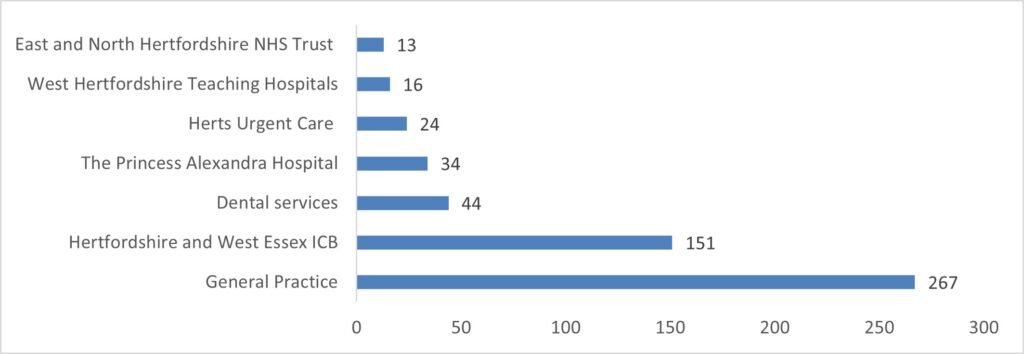
Combined, the top three (GP, HWE ICB and dental services) account for 74% of all formal complaints logged within the Hertfordshire and West Essex ICB. The top four providers together (The Princess Alexandra Hospital, Herts Urgent Care, West Hertfordshire Teaching Hospitals and East and North Hertfordshire Trust) accounted for 14% of all formal complaints logged in 2024/25.
Themes relating to formal complaints in these providers are summarised in the Themes from formal complaints section.
Most complaints received by the ICB are complex in nature. If a complaint is particularly complex or involving more than one provider, this falls into the serious category and the regulations allow for a longer response time (up to a maximum of six months, unless agreed with the complainant before the expiry of that period).
Closed complaints outcomes
In line with the PHSO approach to categorising the outcome of complaints, the ICB record complaints as either ‘upheld’, ‘partially upheld’ or ‘not upheld’.
Following investigation, 73 formal complaints were upheld or partially upheld, 72 were not upheld and 182 were closed as either no further contact was received, or consent was not provided. Fifty eight formal complaints were in progress or had been investigated by another provider.
166 complaints were carried over into 2025/2026.
Outcome of completed complaint investigations
| Outcome code | 2023/24 | 2024/25 |
|---|---|---|
| Closed as a complaint – other process to be followed for the concerns | 0 | 7 |
| Closed as no consent | 55 | 125 |
| closed as no further contact | 29 | 51 |
| Complaint in progress/already investigated by provider | 31 | 57 |
| Complaint suspended at the request of the complainant | 11 | 12 |
| Enquirer signposted to PHSO | 0 | 2 |
| For information only | 26 | 37 |
| information provided | 19 | 12 |
| Not upheld | 80 | 69 |
| Partially upheld | 67 | 52 |
| Resolved | 22 | 11 |
| Upheld | 11 | 19 |
| (blank) | 2 | 1 |
| Total | 353 | 455 |
Upheld/partially upheld complaints
A total of 73 complaints were upheld or partially upheld in 2024/25. The majority of these relate to the following: Hertfordshire and West Essex ICB (38 complaints), General Practice (23) and Herts Urgent Care (HUC) (6).
Of the complaints that were upheld or partially upheld, 33 relate to CHC concerns, this is the highest sub-subject. These mostly relate to Hertfordshire teams, see pie chart below.
Upheld and partially upheld CHC complaints by place-based locality
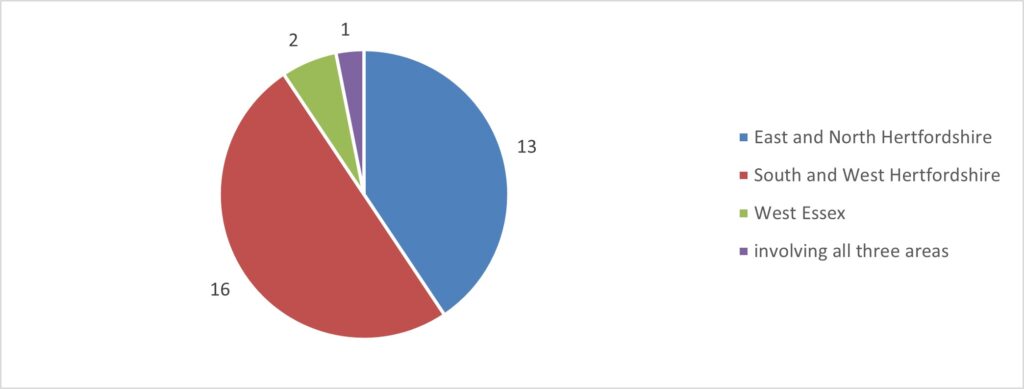
The second highest sub-subject was fundamental care concerns, with 12 complaints either upheld or partially upheld. Six related to General Practice, with two cases each in east and north Hertfordshire, south ad west Hertfordshire and west Essex. Five involved the NHS 111 service provided by HUC.
Themes from formal complaints
General Practice
A total of 267 complaints were received about General Practice services. The distribution by locality is shown in the pie chart below.
GP complaints by place-based locality
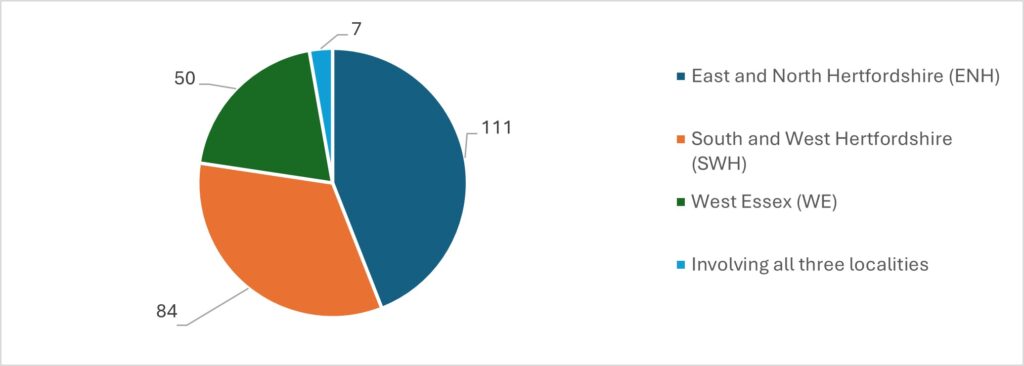
Complaints within ICB remit
For complaints falling within the ICB’s direct responsibility, the most frequently raised concerns were related to Continuing Healthcare (CHC) (88 complaints with 33 either upheld or partially upheld) and 33 related to commissioning functions.
Dentistry
There were 44 complaints about dental services, distributed evenly between the three place-based localities, with 11 each, there were 10 that related to all place-based localities.
Fundamental care concerns – upheld or partially upheld
There were 12 complaints relating to fundamental care that were upheld or partially upheld, the majority were linked to either General Practice or Herts Urgent Care (NHS 111 service).
Patient Advice and Liaison Service (PALS)
Overall activity
During 2024/25, the Patient Experience team received a total of 1,997 PALS contacts, compared to 1,983 in 2023/24.
Responding to PALS
Of the PALS to which the ICB responded in 2024/25 the average number of days to respond was 18 working days.
Breakdown of PALS cases by organisation
The organisations that the HWE ICB received the highest number of PALS queries for in 2024/25 were:
- Hertfordshire and West Essex ICB – 918 contacts (33% increase).
- General Practice – 516 contacts (15% decrease).
- Dentistry – 141 contacts (46% increase).
Together, these three categories accounted for 79% of all PALS contacts logged within the HWE ICB.
Themes and issues arising from PALS linked to these providers are summarised in the Top themes from PALS section below.
Top themes from PALS
- Hertfordshire and West Essex ICB – queries rose by 67%, reaching a total of 918.
- General Practice – queries decreased by 15%, with 516 received in total.
- Dental services – queries rose sharply again by 46%, with a total of 141.
See the Learning from formal complaints, PALS and MP PALS section for details of learning and action.
Members of Parliament (MP) PALS
Overall activity
In Hertfordshire and West Essex ICB, enquiries from MPs are referred to as MP PALS. During 2024/25, the PET received 177 MP PALS enquiries, compared to 166 in 2023/24. During 2024/25, the PET received 177 enquiries.
Responding to MP PALs
Of the MP PALS to which the ICB responded in 2024/25, the average number of days to respond was 51 working days.
Breakdown of MP PALS cases by constituency and sub-subject
The pie chart below presents a breakdown of MP PALS enquiries received during 2024/25, grouped by place-based locality within Hertfordshire and West Essex ICB. These figures reflect the number of times Members of Parliament raised concerns or sought information on behalf of constituents:
- South and west Hertfordshire accounted for the largest proportion, with 42% of all MP PALS enquiries.
- East and north Hertfordshire followed with 37%.
- West Essex represented 18% of the total.
A small number involved multiple localities or were redirected from neighbouring systems.
Member of Parliament queries raised
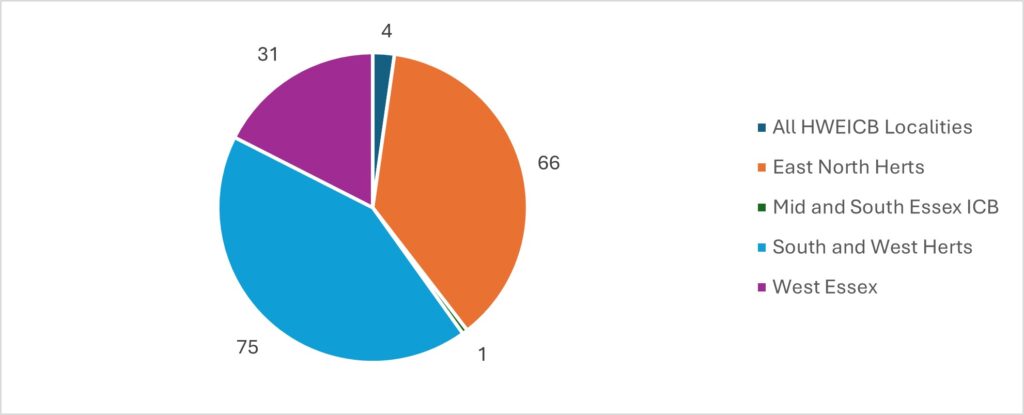
The constituencies generating the highest volume of queries were:
- St Albans (south and west Hertfordshire) – 34 enquiries, representing a 50% increase compared to the previous year.
- Broxbourne (east and north Hertfordshire) – 21 enquiries, showing a 75% increase, the most significant percentage rise.
- Hemel Hempstead (south and west Hertfordshire) – 19 enquiries, a slight decrease of one compared to the previous year.
- Hertsmere (south and west Hertfordshire) – 15 enquiries, marking a 36% increase.
Top themes from MP PALS
During 2024/25, the most frequently raised themes in MP PALS enquiries were:
Commissioning
A total of 32 enquiries were related to commissioning matters. This represents a 17% decrease compared to the previous year, indicating a reduction in commissioning-related concerns or improved clarity around commissioning responsibilities.
Continuing Healthcare (CHC)
There were 22 enquiries relating to CHC – a significant 214% increase. This sharp rise suggests growing public concern or complexity in navigating the CHC processes, prompting more MPs to raise issues on behalf of constituents.
General Practice
There were also 22 enquiries received relating to General Practice, reflecting a 29% increase. This suggests sustained interest and concern in primary care accessibility, service quality, or local practice issues.
Medicines Management
There were 17 enquiries, showing a modest increase of one case from the previous year, pointing to steady but ongoing issues around prescribing, availability, or medication policy.
These trends highlight the evolving areas of concern raised by MPs and may indicate where additional communication, clarification, or service improvement may be required.
Parliamentary and Health Services Ombudsman (PHSO)
Stage two of the NHS Complaints Procedure allows complainants who remain dissatisfied following local resolution to escalate their concerns to either the PHSO or the Local Government and Social Care Ombudsman (LGSCO) for an independent review.
The ICB has a statutory obligation to record and report the number of complaints referred to the PHSO or LGSCO. For the reporting period 2024/25, referral data is based on the date cases were submitted to the Ombudsman, not when they were initially opened.
A total of seven complaints were referred to the PHSO during 2024/25:
- Five cases were not taken forward for investigation.
- One case is currently being reviewed by the PHSO.
- One case was upheld by the LGSCO, not the PHSO.
The upheld LGSCO case related to a young person’s Education, Health and Care Plan (EHCP). In response, a joint action plan with the local authority was developed based on the Ombudsman’s recommendations. This plan was shared with all relevant stakeholders, including the SEND Quality Assurance Board, to ensure system-wide learning and improvement. Actions have been completed, and the case is now closed with the LGSCO.
Learning from formal complaints, PALS and MP PALS
General Practice
Themes/issues
Issues around shared care for ADHD, including delayed communication and prescribing responsibilities.
Prescribing challenges are related to:
- lack of clarity of red/amber list drugs
- timing of letters and communication impacting medication continuation.
Actions taken
Although no specific practices were consistently identified, themes reflect systemic challenges in GP-ICB interface and prescribing protocols.
The ICB is reinforcing GP communications on shared care agreements, including ADHD medication and improving understanding of prescribing protocols within the Hertfordshire and west Essex system.
Continuing Healthcare (CHC)
Themes/issues
Themes are around:
- Poor communication about CHC process.
- Lack of support for families navigating eligibility.
- Delays in decision-making.
- A lack of transparency in criteria.
Actions taken
The CHC team has highlighted a need for improved family engagement and clearer information around the CHC journey.
The CHC team is strengthening their communication materials, with the help of families, and have introduced clearer responsibilities for clinical staff with specific oversight within localities, clinical lead access to the main communication hub, localised training for CHC staff and system partners, improved inductions for new CHC starters and earlier engagement with patients and families to set expectations.
Commissioning
Themes/issues
Themes relate to ongoing concerns around shared care pathways, especially ADHD. Additionally, funding clarity for IFR (Individual Funding Requests) and services like home vaccinations for COVID-19 and weight-loss medication pathways.
Actions taken
The ICB is reinforcing GP communications on shared care agreements, including ADHD medication aiming to ensure fairness, consistency and transparency. The Hertfordshire and west Essex clinical guidance is updated regularly to ensure information around prescribing medications, such as weight-loss injectables, is accurate and reflects the ICB plans for the implementation of any relevant NICE guidance.
Dentists
Themes/issues
The main concerns relate to access to NHS dentistry within Hertfordshire and west Essex. Issues also include:
- allegations of providers charging more than the NHS banded prices for treatment
- access to and timeliness of orthodontics treatment for children.
Actions taken
These issues reflect national access issues and the HWE ICB PET is reiterating the process for registration of NHS dentists to enquirers and providing information about the urgent dental treatment pathway (accessed via NHS111) is clear to support patients in need.
Herts Urgent Care (HUC – NHS 111)
Themes/issues
Although smaller in number than the other themes and trends above, these delays in callbacks from clinical staff after initial triage are often upheld, due to the time it takes for clinical staff to call back.
Actions taken
HUC articulate in their responses that although safe, appropriate assessments have been undertaken and safety netting advice provided, occasionally there are delays due to surges in demand. The HUC dispatchers have been sent reminders, by HUC, to ensure calls are made to patients prior to a breach of the recommended call back time frames.
Compliments
During 2024/25, the PET received 14 compliments, reflecting a 33% decrease from the 21 compliments received in 2023/24.
Of the 14 compliments received during 2024/25, the majority related to two key themes:
- Communication: 10 compliments.
- Access to services: 3 compliments.
The services most commonly associated with these compliments were:
- General Practice: 4 compliments.
- Non-urgent patient transport: 2 compliments.
These expressions of appreciation reflect positive experiences in interpersonal communication and service accessibility. All compliments have been passed on to the relevant teams and named individuals to acknowledge and reinforce good practice.
Feedback on priorities from 2023-25
| Action | Achievement | RAG rating | Outstanding actions |
|---|---|---|---|
| Adapt the Patient Experience process and team to accept delegation of complaints from NHS England regarding all aspects of primary care services. | All relevant changes made. Management of primary care service complaints are part of business as usual. | Green | Complete |
| Share lessons learnt from complaints/queries. | Reporting is currently shared via the System Transformation and Quality Improvement Committee and to the Nursing and Quality Senior Management Team meeting. The HWE ICB Executive team has an established schedule for lessons learnt. A more detailed annual report has been created for 2024/25. | Amber | Reporting schedule for interface meetings will start from July 2025. |
| Developing relationships with providers. | All relevant actions taken. Regular meetings with acute providers in place Meeting with other providers, as required. | Green | Complete |
| Continue to collect Equality, Diversity and Inclusion data from people that raise concerns with the PET. | Monitor the team’s compliance with sending out demographic form, and when this is returned to the team. | Green | Complete six-monthly reviews of data. |
| Develop process to gather feedback from persons contacting the PET to improve service/standards as necessary. | It has not been possible to progress this. It will be prioritised in 2025/26. | Red | |
| To develop regular reporting on the handling of patient feedback, themes and learning. | Reporting is currently shared via the System Transformation and Quality Improvement Committee and to the Nursing and Quality Senior Management Team meeting. The HWE ICB Executive team has an established schedule for lessons learnt. A more detailed annual report has been created for 2024/25. | Amber | Reporting schedule for interface meetings will start from July 2025. |
| To review internal processes against the PHSO guidance on good complaint handling (2024). | A Quality Improvement plan was created to combine actions and demonstrate improvement. The PET has completed a self-assessment of the complaint’s standards and are working at aligning existing actions with the QI plan and whether there are any gaps. | Green | Complete |
Improvements
The plan for 2025/26 is to build on the momentum created in the past 12 months and sustain and improve performance further. In addition to this, the PET will also focus on the following additional actions:
- Generate learning reports which will be shared from July 2025.
- Complete the remaining steps of the PHSO “Making sure your organisation meets the Complaint Standards” guidance document.
- Complete an annual satisfaction survey with enquiries.
Recommendations
The Board is asked to:
- receive the Patient Feedback Annual Report 2024/25 for assurance and approve its publication on the ICB website.
- note the improvements following a full review, with a recovery plan underway to address capacity challenges within the complaints function, aiming to strengthen performance, ensure timely responses, and support sustainable service delivery through future-focused actions.